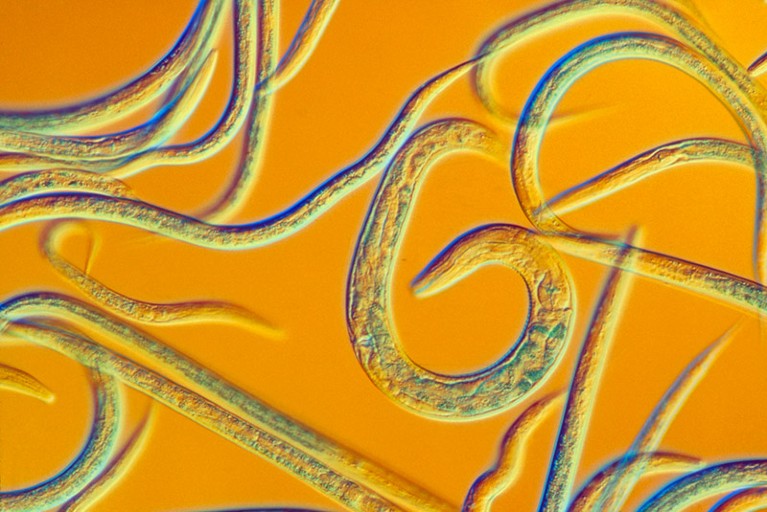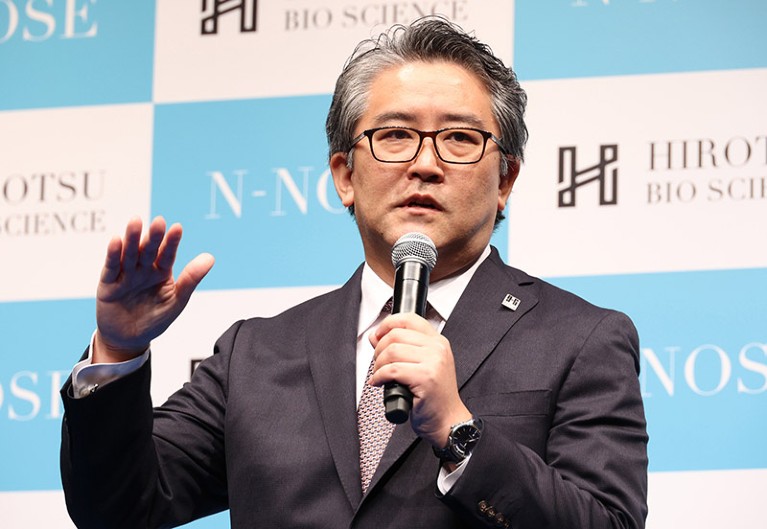
The worm Caenorhabditis elegans, a laboratory stalwart, is central to a Japanese company’s cancer-screening test.Credit: Sinclair Stammers/Science Photo Library
Questions have been raised about the accuracy of a test sold by a Japanese start-up company that is designed to detect a person’s risk of certain types of cancer from a urine sample. Two Japanese medical societies have launched an investigation following concerns voiced by several doctors about the accuracy of the tests, which rely on the movement of microscopic nematode worms to detect the presence of tumours.
The test, known as N-NOSE, is produced by Hirotsu Bio Science, based in Tokyo. The company says its test can detect 15 types of cancer, including breast, prostate, stomach and oesophageal cancer. The tests, at a cost of ¥14,800 (about US$100) each, have been on the market in Japan since 2020. The company urges people whose results put them at the highest risk of cancer to seek specialist advice; so far, about 5% of the 500,000 people who have been tested have been in this category.
The test uses a proprietary algorithm to assess whether nematode worms have moved towards a urine sample in a dish. The idea for it came to the president of Hirotsu Bio Science, Takaaki Hirotsu, following reports1 that the larvae of the nematode worm Anisakis simplex was attracted to stomach tumours. He wondered whether the laboratory stalwart Caenorhabditis elegans, which has a large number of olfactory receptors, might be attracted to cancer — and whether measuring the movement of the worms towards a tumour or towards the chemicals that a tumour gives off could be used for diagnosis. His team’s 2015 observation2 that C. elegans is attracted to urine samples from people with cancer has been verified in breast cancer and prostate cancer by independent research groups in Italy3 and the USA4, respectively. However both groups noted that the effect depends on the specific conditions of the test and that, under some conditions, it is not observed.
In a 2021 paper5, the team behind N-NOSE presented results showing that the commercially available test has a sensitivity of around 87%, meaning that of 100 people with cancer, 87 will be picked up by the test. They quote a specificity of 90%, meaning that of 100 people without cancer, 90 would get an N-NOSE result indicating they’re at low risk.
A sensitive question
Table of Contents
But several doctors have queried these figures, suggesting there are higher levels of both false negatives and false negatives in people using the tests.
At a cancer detection and diagnosis conference in Fukuoka in June, Kuniyuki Tashiro, a doctor from Fukuoka Wajiro Positron Emission Tomography (PET) Imaging Diagnostic Clinic, told a session dedicated to nematode testing that out of 333 people who took the N-NOSE test and received results indicating they were high-risk, just 8 had cancer — and 2 of those cancers were a type that N-NOSE does not claim to detect. Furthermore Yoichi Mizutani, a doctor at Nishinokyo Hospital in Nara, says that out of 28 people flagged as high risk by N-NOSE, not one had cancer. Meanwhile Seigo Fujita, a doctor and director of a cancer centre at Miyazaki Tsuruta Memorial Clinic in Miyazaki City, Japan, described how he had seen ten people known to have cancer who all received N-NOSE results describing their cancer risk as low.
On the back of these concerns, radiologists involved in PET screening for the Japanese Association for Cancer Detection and Diagnosis in Tokyo have joined with a working group of the PET Nuclear Medicine Subcommittee of the Japanese Society of Nuclear Medicine in Tokyo to launch a survey into the product. They have asked member clinics to provide information on how many patients have had a PET scan for cancer because of an N-NOSE test result, and what their PET screening results eventually were.
A statement provided to Nature by Hirotsu Bio Science in response to the medical societies’ survey says that PET screening is not suitable for the early detection of cancer for which N-NOSE is intended. The survey “cannot provide a reliable verification” of the N-NOSE technology, the company says.

Takaaki Hirotsu is the founder of Hirotsu Bio Science, the company behind the N-NOSE cancer-screening test.Credit: Yoshikazu Tsuno/Gamma-Rapho via Getty
The company also has plans for expansion. At a press conference also in June, Takaaki Hirotsu signed a memorandum of understanding with the Global Health Equity Fund, an investment fund supported by the WHO Foundation in Geneva, Switzerland — a charity affiliated with the World Health Organization — and Israeli venture-capital firm OurCrowd in Jerusalem. The company has also presented its research to the World Economic Forum in Davos, Switzerland, and to the Science and Technology in Society forum in Kyoto, a major conference of global scientists and policymakers. The company is selling N-NOSE in China and plans to launch in the United States next year.
The company’s chief technology officer, Eric di Luccio, told Nature that the criticisms raised by the doctors are “100% bullshit”.
He referred Nature to an analysis prepared by the company of the figures that the doctors presented. The statement says that the concerns raised by doctors have not been subject to peer review, unlike many of the figures presented by the company, which appear in published papers. The statement acknowledges that the test is not 100% accurate — very few tests are — but says that the company “will continue to actively conduct joint research with other institutions and strive to achieve even higher accuracy”. It points out that N-NOSE does not aim to diagnose, only to provide guidance on risk levels.
“This is a new technology and it takes time and effort to make people understand it,” di Luccio says.
But when it comes to cancer, both false positives and false negatives can cause harm. So the concerns need to be investigated, says Yuji Yamada, a Japanese geriatrician at Icahn School of Medicine at Mount Sinai, New York City. People who get false positives might go on to have unnecessary biopsies, or scans that expose them to radiation. And if screening results are negative when someone actually has cancer, detection might be delayed, lowering the chance of survival.
The results of the investigation by the Japanese medical societies could be published early next year.
